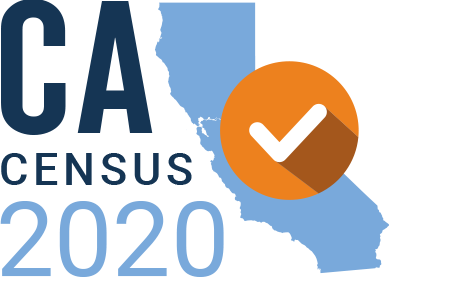Census Office Events
The California Complete Count – Census 2020 Office is committed to engaging its many partners, from counties to Tribal Governments, education institutions, community-based organizations, and more, through events, webinars, meetings, convenings, and consultations. To request the California Census Office at a speaking engagement or event, please use the request form below.
To view Census Office archived events, visit https://census.ca.gov/archives/.
About Peer Learning Labs
On April 24, 2020, the Census Office launched weekly Peer Learning Labs, a virtual learning space where partners explored innovative practices in their Census outreach, for example, language and communication access, trusted messengers, and strategies in times of COVID-19.
The purpose of these labs was two-fold:
- To enhance coordination and synergies by learning from one another’s good practices
- To leverage opportunities and cross-promote activities and resources.
In September, the Census Office concluded with a series of Peer Learning Labs featuring the Administrative Community Based Organizations, who discussed how they supported organizational and community capacity building and outreach activities. Many partners spoke of the legacy of the Census collaborations for future endeavors.
You can find the presentations below.
Should you have any questions about the Peer Learning Labs, please reach out to outreach@census.ca.gov.
Census Peer Learning Labs

Organizing with Purpose - Conversation Series with ACBOs
Date: September 11, 18, and 25th
Time: 2:00 pm to 3:00 pm
Recording: See below
Topic: A key strategy of California’s Census outreach efforts is to work with community-based organizations who have the knowledge and experience of the very people we are trying to reach to take the Census. For some organizations, the Census is a one-off project, whereas for others, it is an integral part of their portfolio for civic engagement and building power in communities.
In this peer learning lab, our partners will discuss how they have included the concept of organizational and community capacity strengthening into their vision and interactions with the groups they support. These are the groups that will continue to work in their communities, long after the Census count is completed.
Speakers:
September 11th – Link to Facebook Event (Facebook)
- Stephanie Kim – United Way of the Bay Area (Region 3 ACBO)
- Cindy Quezada – Sierra Health Foundation Center for Healthy Project Management (Region 6 ACBO)
- Pablo Rodriguez – Faith in Action Network (Region 4 ACBO)
September 18th – Link Facebook Event (Facebook)
- Niva Flor – Sacramento Region Community Foundation (Region 1 ACBO)
- Sarah Middleton – Charitable Ventures of Orange County (Region 9 ACBO)
- Vanessa Bechtel – Ventura County Community Foundation (Region 5 ACBO)
September 25th – Link Facebook Event (Facebook)
- Deborah Phares – Inland Empire Community Foundation (Region 7 ACBO)
- Michele Silverthorn – United Way of San Diego (Region 10 ACBO)
- Stephania Ramirez – California Community Foundation (Region 8 ACBO)
Presentations:

Get Out the Count: Language & Communication Access
Date: August 28, 2020
Time: 1:30 pm to 2:30 pm
Recording: Link to recording
Topic: CA Census partners across California are reaching out to residents in ways that are linguistically and culturally appropriate so that they have equal and meaningful access to the importance and relevance of Census 2020.
In this Peer Learning Lab, we will explore questions, such as: What strategies are you using to reach diverse populations, especially in those languages and communication methods that may not be considered as “top” languages in California? What messages are you using to provide access and the last push to fill out the Census for community members to ensure they are counted?
Speakers:
- Emma Gonzalez, San Mateo County Census 2020
- Manpreet Kaur, Jakara Movement
- Sukaina Hussain, Council on American-Islamic Relations
- Susan Henderson, Disability Rights Education and Development Fund
- Patricia Vazquez-Topete, CA Complete Count Office
- Tho Vinh Banh, Moderator, CA Complete Count Committee
Presentations:
- Te Puedo Contar Poem (PDF)
- CAIR-CA Presentation (PDF)
- DREDF Communication and Disability Presentation (PDF)
- Jakara Movement Census Presentation (PDF)
- San Mateo County Presentation (PDF)
- Get Out the Count Outreach Language and Communication Access (PDF)
Resources:
- Punjabi Language and Census 2020 (Facebook)
- Sikh Census 2020 – Jakara Movement – Bhupinder Babbal (YouTube)
- Eid-ul-Adha Drive Through (YouTube)
- Census 2020 San Mateo County – Deputy Fire Marshal Nicole Stoney (Google Drive)
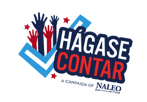
Get Out the Count: Outreach to Latinx
Date: August 21, 2020
Time: 1:30 pm to 2:30 pm
Recording: Link to recording
Topic: California’s 15 million Latinos make up about 30 percent of the state’s population and half are children. As the largest demographic group in the state, an undercount of Latinos will severely jeopardize California’s ability to obtain an equitable share of representation and federal resources. Latinos are more likely than non-Latinos to live in hard-to-count places, including in the low responding census tracts.
In this peer learning lab, we will explore questions, such as: With 30 days left to get out the count, what tactics are you using to encourage Latinx households to take the Census? How does data drive your strategy and what are effective messages now? How can elected officials engage their community to be counted?
Speakers:
- Quintilia Ávila, Regional Program Manager and Southern California Lead – California Complete Count – Census 2020 Office
- Councilmember Esmeralda Soria, City of Fresno
- Councilmember Maria Nuñez, City of San Marcos
- Dorian Caal, Director of Civic Engagement Research, NALEO
- Ely Flores, California Director of Civic Engagement, NALEO
- Rachel R. Rios, Executive Director, La Familia Counseling Center, Inc.
Presentations:
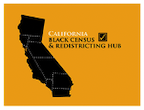
Final Call with California Calls: Reflection on Census Outreach to the African American Community
Date: August 7, 2020
Time: 1:30 pm to 2:30 pm
Recording: Link to recording
Topic: The California Black Census and Redistricting Hub, a network of over thirty Black-led and Black-serving organizations across the state, focused on maximizing participation in the upcoming census and redistricting process. The Hub used a mix of training, strategic communications, data and grassroots organizing to conduct targeted outreach campaigns. With the conclusion of their MyBlackCounts Campaign, we’ve invited the Hub team to reflect on their operations, especially during COVID-19.
In this peer learning lab, we will explore questions, such as: What worked well or hindered operations and outreach tactics? How did the partnership coordination work? Who were the partners? What is an example of a story that made a difference to Census 2020?
Speakers:
- Ama Nyamekye, Project Manager Black Census and Redistricting Hub, California Calls
- Kevin Cosney – Associate IVE Director, California Calls
- Lanae Norwood – Strategic Communications Consultant – MYBLACKCOUNTS.org
- David Tucker, Facilitator, CA Complete Count Office
Presentation:
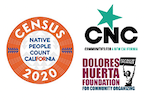
Get Out the Count: Rural Communities
Date: July 17, 2020
Time: 1:30 pm to 2:30 pm
Recording: Coming soon!
Topic: The disruption to census operations in the wake of COVID-19 can be felt especially by rural communities and those with limited access to the internet. Partners have had to shift their tactics from face to face outreach to digital tactics and phone banking in hard-to-count and hard-to-reach communities. Now that the majority of rural households have received their census packets during Update Leave, the rural response rates are starting to increase.
In this peer learning lab, we will explore questions, such as: What are the characteristics of the rural areas that make them unique? What are some of the tactics –specifically phone banking– that have been effective in reaching rural communities? How did you support language access and deploy culturally relevant strategies? What are some resources that other partners can use?
Speakers:
- Ricki McCarroll, Native People Count Campaign
- Pablo Rodriguez, Executive Director, Communities for a New California Education Fund
- Daniela Fernández, Community Engagement Specialist, Connecting Point
- Camila Chavez, Co- Founder and Executive Director, Dolores Huerta Foundation
- Mai Thao, Facilitator, CA Complete Count Office
Presentations:
Resources:

Moving Faith Communities to Take Action
Date: July 10, 2020
Time: 1:30 pm to 2:30 pm
Recording: Link to archived event (Facebook Live)
Topic: Congregations and faith communities have deep relationships with and knowledge of people who are traditionally hard to count populations, making them a vital source of trusted messengers.
This Peer Learning Lab will expand our reach through our partners, Council on American-Islamic Relations – California, California Black Census and Redistricting Hub, Asian American Advancing Justice – LA, and PICO California.
We will explore the questions: What are tested Census outreach approaches that can move people to take the Census? Who are the grassroots leaders who can inspire their peers, elders, and community members to create a broader network of Census activation? How is Census outreach incorporated in faith teachings and activities in different languages?
Speakers:
- Andrew Lee, Faith Census Hub Manager, PICO California
- Naindeep Singh, Executive Director, Jakara Movement
- Ismahan Abdullahi, Muslim American Society – PACE
- Joy Johnson, PhD, Life Matters, Inc and Board of Directors President of Sacramento Act
- Marcy Kaplan, Facilitator, CA Complete Count Office
Presentations:

Including the LGBTQ+ Community in Census
Date: June 26, 2020
Time: 1:30 pm to 2:30 pm
Recording: Link to archived event (Facebook Live)
Topic: California is home to the nation’s largest statewide Lesbian, Gay, Bisexual, Transgender and Queer (LGBTQ+) population – and key LGBTQ+ population centers like West Hollywood and San Francisco – yet every decade, California’s diverse LGBTQ+ community finds ourselves undercounted, which denies us power, representation and funding for programs that the most vulnerable members of our community need to survive. Nationally, 1 in 5 LGBTQ+ families are enrolled in the Supplemental Nutrition Assistance Program (SNAP) and Medicaid – programs that are funded based on census data – which is nearly double the rate of non-LGBTQ+ families. Additionally, the LGBTQ+ community is remarkably diverse, existing within all communities.
This peer learning lab will explore questions, such as: What does this level of economic disparity and intersectionality mean for LGBTQ+ census outreach? What should we know about the LGBTQ+ experience when it comes to navigating the 2020 Census? What impact has the COVID-19 crisis had on LGBTQ+ outreach? How are community partners working on the ground to reach and then to lift up the voices of LGBTQ+ community?
Speakers:
- Meghan Maury, Policy Director, National LGBTQ Task Force
- Jeremy Payne, Associate Program Director, Equality California Institute
- Eddie Martinez, Executive Director and Yesenia Mendoza, Development Coordinator, Latino Equality Alliance
- Mignonne Pollard, Facilitator, CA Complete Count Office
Resources:
- National LGBTQ Task Force Why the Census Matters for LGBTQ People Fact Sheet
- Count the Nation LGBTQ+ 2020 Census PSA
- National LGBTQ Task Force Unbranded LGBTQ+ Social Media Graphics
- Equality California 2020 Census Pride Month PSA
- #WillBeCounted, “Social Media Graphics“

Native People Count California
Date: June 12, 2020
Time: 1:30 pm to 2:30 pm
Recording: Link to recording
Topic: California has the highest population of Native American and Tribal populations in the country. Yet, they are among the least likely to respond to the decennial Census. To ensure that they are counted, outreach is woven throughout the California Complete Count – Census 2020 Office funding efforts. During this Peer Learning Lab, we will learn about how the California Indian Manpower Consortium and the California Native Vote Project are working statewide to reach this population, especially during the time where many of the tribal communities are impacted by the pandemic. We will learn about why his is the “hardest” of the hard to count populations and hear voices from urban and rural perspectives. We will also hear from a member of the Yurok Tribe (Northern California) who will talk about the creation and activities of the Northwest Intertribal Census Workgroup and the significance of the Census to Tribal communities.
This peer learning lab will explore questions, such as: What are the historical and contemporary reasons for Native Americans being underrepresented? What have been the structural barriers for outreach and what are unique outreach approaches? How can other Census partners support the efforts? What are potential impacts of the Census outreach?
Speakers:
- Jesus (Jesse) Fraire, California Native Vote Project
- Chrissie Castro, Founder / Senior Advisor, California Native Vote Project
- Elaina O’Rourke, Yurok Tribe
- Lorenda Sanchez, Executive Director, California Indian Manpower Consortium
- Kayla Olvera Hilario, Facilitator, Ione Band of Miwok Indians, Tribal Affairs Specialist, CA Complete Count Office
Presentations:
For more information about Native People Count California outreach campaign

Integrating Immigrants and Refugees into Census Outreach
Date: May 20, 2020
Time: 1:30 pm to 2:30 pm
Recording: Link to recording
Topic: Immigrants and Refugees are amongst our hard to count populations and both groups have an array of diversity of immigration status and ethnic backgrounds. During this peer learning hour, we will learn about their concerns and challenges, for example, some may be learning about the “Census” for the first time, while others may lack trust in government. We will learn about good practices for culturally sensitive outreach approaches for the Census.
This peer learning hour will explore the questions: Who are the “immigrants and refugees” we are trying to reach? What do their perspectives and concerns indicate for census promotion and outreach approaches? How is Census outreach incorporated into existing services or places accessed by immigrant and refugees?
Speakers:
- Esperanza Guevara, Census Campaign Manager, Coalition for Humane Immigrant Rights (CHIRLA)
- Basim Elkarra, Executive Director, CAIR Sacramento Valley/ Central California
- Dr. Jesus Martinez, California Complete Count Committee Member and Executive Director, Central Valley Immigrant Integration Collaborative (CVIIC)
- Patricia Vazquez-Topete, Facilitator, CA Complete Count Committee
Presentations:

Community Engagement with Diverse API Groups
Date: May 22, 2020
Time: 1:30 pm to 2:30 pm
Recording: Link to recording
Topic: The Asian and Pacific Islander American (API) community is diverse, ethnically, and linguistically, as well as their historical roots of coming to America. Among the 22+ million people that make up the API community, the highest number — 5 million can trace their roots to China and the lowest number – 125 people can trace their roots to the Maldives. Nearly all Asian immigrant groups from Bangladeshi to Vietnamese, have seen their communities increase between 30% to 100% in the past twenty years and Asians are now the fastest growing immigrant population in the US. Census data is used by the API communities to understand the diversity of the community across a range of social indicators.
Speakers:
- June Lim, Demographic Research Project Director, Asian Americans Advancing Justice – Los Angeles
- Tavae Samuelu, Executive Director, Empowering Pacific Islander Communities (EPIC)
- Mai Thao, Lead Regional Program Manager, CA Complete Count Office
- Sara Pol-Lim, Facilitator, CA Complete Count Office
Presentations:
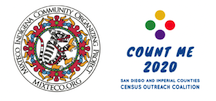
Nurturing Community Knowledge Peer Learning Hour
Date: May 15, 2020
Time: 1:30 pm to 2:30 pm
Recording: Link to Recording
Topic: Trusted messengers from community-based organizations are key to Census outreach. In an interactive format, the partners will explore how their work is grounded in community values and is building on existing social justice infrastructure to engage and reach people who are so often left behind. How do trusted messengers and their organizations educate their community members about the census, while at the same time foster appreciation of traditional knowledge and identity? How does their Census outreach work with their networks, as well as utilize their proven approaches, to strengthen their communities’ resilience and cohesion? What impact has the COVID-19 crisis had on the outreach efforts?
Speakers:
- Victor Espinosa, Farmworker Census Outreach Director, Mixteco/Indigena Community Organization Project
- Arcela Nunez-Alvarez, PhD, Co-Founder / Co-Director, Universidad Popular, a member of the Count Me 2020 Coalition, San Diego
- Connie Hernandez, Facilitator, CA Complete Count Office
Presentations:
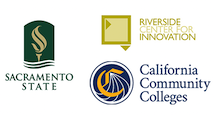
Engaging with Students in Higher Education
Date: May 8, 2020
Time: 1:30 pm to 2:30 pm
Recording: Link to recording
Topic: Schools and universities serve as a gateway to our hard to count communities. Students support outreach to their peers, family members, and community members. Students were the cornerstone, the key players, in census outreach on campus. Currently, students are home and when they will return to college campuses is unknown. The questions we will address are: How do we reach college students who have left the campus? Who are the trusted messengers to reach this group?”
Speakers:
- Noel Mora, Serna Center Coordinator, Sacramento State University
- Mark Perry, Project Coordinator, California Chancellor’s Office Community Colleges
- Marlenee Blass, M.Ed., Associate Director of the Center for Innovation, UCR School of Public Policy
- Mignonne Pollard, Facilitator, CA Complete Count Office
Presentations:
Now What?
Date: May 1, 2020
Time: 1:30 pm to 2:30 pm
Recording: Link to Recording
Topic: We will spring-off of our first strategy discussion to focus on “Now What?” The second Peer Learning Hour will focus on how two of our statewide partners are facing enormous challenges to reach children 0 to 5, people with disabilities, and older adults. The speakers will discuss the question: “Now What?” – when we come out of shelter-in-place, what do you see as the new landscape? How are you adjusting your operations to count those who have been undercounted in the past Census? How do we ensure access to communication and information
Speakers:
- Moira Kenney, First 5 Association of California
- Susan Henderson, Executive Director, Disability Rights Education & Defense Fund
- David Tucker, Facilitator, CA Complete Count Office
Presentations and Resources:

Pivoting our Outreach Strategy
Date: April 24, 2020
Time: 1:30 pm to 2:30 pm
Recording: Link to Recording
Topic: The debut of our series of Peer Learning Hours will explore how partners are re-strategizing and creating new goals to shift their outreach activities at the local and national levels. The speakers will discuss the question: With the new shelter-in-place, what is your new strategy and activities? Do you have templates and tools to share with others?
Speakers:
- Lizette Escobedo, Director of National Census Program, NALEO Educational Fund
- Ely Flores, CA Director of Civic Engagement, NALEO Educational Fund
- Ama Nyamekye, CA Black Hub Project Manager, California Calls
- Yumi Sera, Facilitator, CA Complete Count Office
Presentations:
